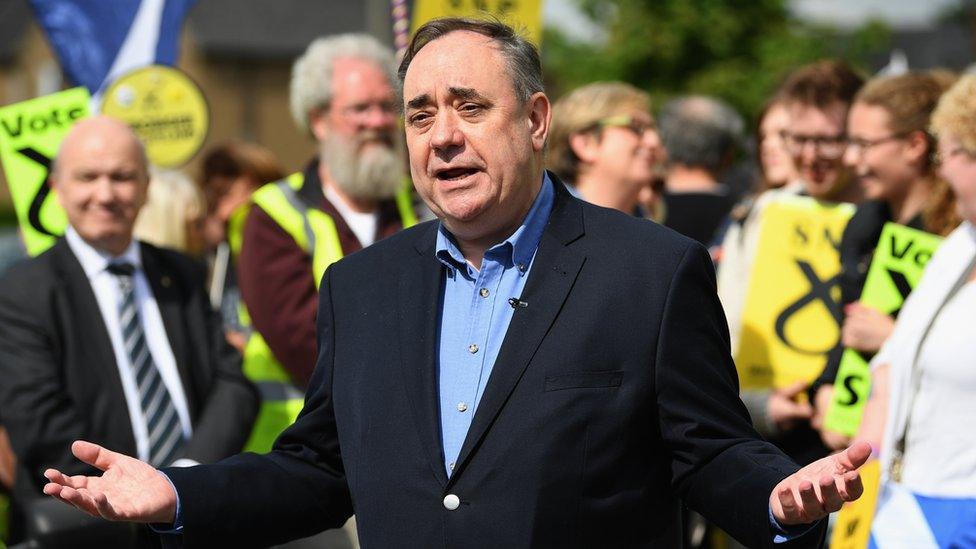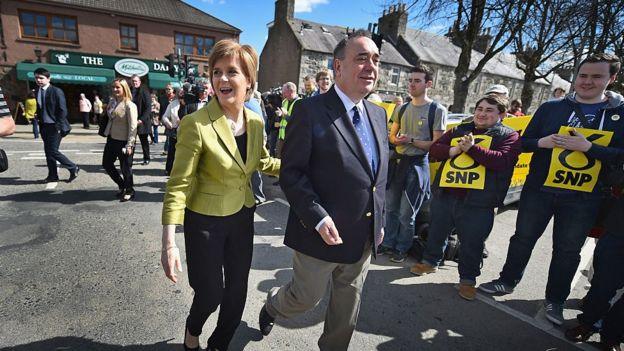No SNP civil war, but turmoil can be just as bad
- Published

Alex Salmond denies the claims made against him
Spent much of today chatting to sundry folk within the SNP and the wider independence movement. The topic? Alex Salmond and the political impact of this quite remarkable controversy.
I was struck by the plaintive, woebegone nature of the exchanges - or most of them. Struck but not remotely surprised. In the short-term, it is hard to see the events of the past week as anything other than deeply damaging for the SNP.
In the short-term - but perhaps also in the medium-term too. The police say they are at an early stage in their inquiries into the complaints lodged against Mr Salmond.
The Court of Session, entirely rightly and admirably, tends to focus upon precision and justice, rather than the speedy remedy of controversy in the political world.
Mr Salmond and his supporters hope there will be a relatively timeous resolution of his case against the procedure followed by the Scottish government in handling the complaints against him. But that will not be tomorrow, nor next week, nor perhaps before the end of the year.
So, as one senior figure put it to me, the danger for the SNP is "drift" - a lack of focus, a decline in morale. Just when the party needs to be at its sharpest for Brexit and, perhaps, perhaps, an independence referendum to come.

Nicola Sturgeon could face the problem of a decline in party morale
Rival parties are, of course, seizing upon the SNP's troubles, albeit within limits. Today, for example, Jackson Carlaw, the deputy leader of the Scottish Conservatives, called upon the SNP to "focus on governing the country".
In one sense, of course, this is merely an amplification of the Tory argument that Nicola Sturgeon should stick to the day job. And one understands Mr Carlaw's stance. He has a decided knack for getting to the core of events.
But perhaps, deploying his familiar irony, Mr Carlaw might privately concede that his comments sit just a fraction uncomfortably with the reality of governance at the UK level in these Brexit days. Ms Sturgeon may be in trouble but she has yet to see protesting resignations from her Cabinet.
SNP parliamentarians have spent the day mulling jointly over the prospects for the new political season at a long-scheduled gathering. In particular, they were invited to cast an eye towards the Programme for Government which will be unveiled at Holyrood next week.
One insider caustically observed to me: "We could abolish income tax on Tuesday. Still wouldn't take Salmond off the news bulletins and the front pages."
'Distinct factions'
For the avoidance of doubt, I do not think that income tax will be abolished, at least not in the foreseeable future.
Among my interlocutors, none was prepared to deploy the term "civil war" about the party's current travails. I think I can understand why.
Strictly, a political civil war would involve two or more distinct factions, with evident leaders and an ideological distinction. Think Benn versus Healey in Labour's disputes of the early 1980s. It would be brutal but relatively clear-cut.
This is different. This is turmoil, confusion, disquiet. One source described an ordinary SNP branch meeting this week. Folk were unsure, uncertain what to say or do. I suspect that is more typical than the zealous certainty one occasionally encounters on social media, which prompted the "civil war" description in the first place.
Still, it matters little. Turmoil can be just as undermining, just as sapping of confidence as outright political conflict. Indeed, it can be worse. Uncertainty breeds disquiet and can demoralise, if unchecked.
The principal protagonists are, of course, Alex Salmond and his successor Nicola Sturgeon. It is evident that both feel frustrated by developments.
Off the record
For his part, Mr Salmond is aware of the potential damage but argues, vigorously, that he had no option other than to act as he has. He insists he has been unjustly accused and unfairly treated in the handling of those accusations.
Other than to insist that the procedure has been fair, the Scottish Government (as a corporate entity) can say little.
Similarly, Nicola Sturgeon, the political head of the SG, is constrained. She has confined herself thus far to arguing for matters to take their course, while signalling (by her absence of declared support) that she is decidedly less than delighted with Mr Salmond's crowd-funding campaign.

Others, off the record, are more overt. They say the crowd-funding campaign is a demonstration of power play, an attempt to corral and present extensive support.
Mr Salmond and his supporters are equally adamant that such is not the case.
They say, again, that the situation is not of their making, that they were obliged to take legal action and that the crowd funding is a response to a desire by supportive individuals to help. A response, not a strategic initiative.
Cordial relations
Self-evidently, the issue has scarcely encouraged the continuation of cordial relations between Mr Salmond and his successor.
In which regard, Nicola Sturgeon declined to endorse - indeed, to comment upon - the fact that Mr Salmond's crowd-funding campaign directly links the appeal to the salience of Scottish independence.
Ms Sturgeon pointedly - and repeatedly -sought to focus attention upon the need to remove any obstacles from women being empowered to come forward with complaints.
For his part, Mr Salmond appeared to imply criticism of Ms Sturgeon's previous decisions to suspend from membership people who have faced sundry accusations.
Again, to stress, his supporters are adamant that this episode is not remotely a challenge to Nicola Sturgeon's leadership or authority. Rather, they say it is driven by external events, by the administrative handling of the complaints by the SG.
They argue further that the decision to resign was deliberately designed to assist Ms Sturgeon.
It was predicated upon the calculation that she would come under continuing opposition pressure to suspend Mr Salmond, even as she continued to insist that there was no legal basis for doing so because the detail of the claims was, rightly, not available to the party.
'Temporary custodians'
Of course, some see this issue in a different light. They note that Mr Salmond refers to the prospect of division within the party, were he to be suspended.
Mr Salmond argues that underlines his readiness to help in pre-empting a problem. Others say it is a convenient way of stressing the extent of his historic and potential support within the SNP.
Where next? Again without saying overmuch, Ms Sturgeon - I am told - addressed the issue in her speech to the parliamentarians today.
She too placed current events in a wider context by noting that the holders of her office were "temporary custodians" of the campaign for independence.
However, she apparently added that she would not wish to be a citizen, let alone First Minister, in a country which placed any barriers in the way of women speaking out. To be clear, she was speaking generically, not in the particular.
Again, Mr Salmond insists that he is very far from seeking to pre-empt complaints. He argues that he entirely respects the right of women to lodge complaints and indeed seeks to protect the anonymity of those who have complained against him.
Something, he says, which has been jeopardised by the leaking of information.
More to come, one suspects.